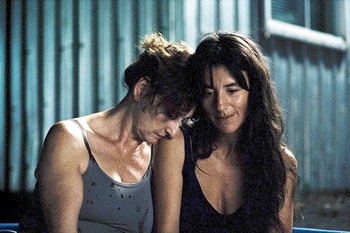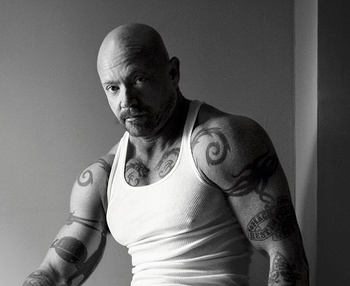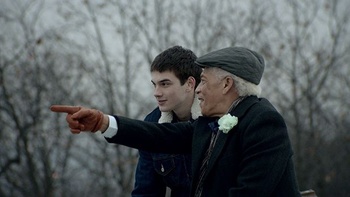Pink Screens, the annual celebration of queer cinema, is presenting no less than ninety films! For ten whole days, the silver screen will turn pink gaily to combat stereotypical conceptions and simplistic dichotomies.
Pink Screens has become a permanent fixture with an ever-increasing audience. That’s a veritable tour de force, when you consider that this international festival operates on a purely voluntary basis. The organisation Genres d’a côté and the Cinema Nova and Aventure cinemas join their unpaid forces, and they have again managed, for this twelfth edition, to put together a varied, high-quality programme: unreleased feature length films or seldom-screened classics, controversial documentaries, and a strikingly high number of short films. But there is also an exhibition, debates, performances, school productions, and even pornographic readings. Indeed, in addition to cinephile entertainment, this festival always provides food for thought and reflection on sexual identity/freedom and gender diversity. Head press officer Bruno Heyse and l’incontournable Jacques Paulus, a long-time member of the programming team, spoke to us about the festival. Jacques Paulus: “I first have to make clear that the programming of our festival is done by a team of six people. We also try to establish consensus for the definitive selection of the films, though that sometimes involves fierce discussions. I think the whole team must have screened about 350 films over the
past year.”
Pink Screens: gay times for queer cinema


May we thus conclude that queer cinema is flourishing?
Jacques Paulus: Or that there is a lot of bullshit out there! [Laughs]
Bruno Heyse: The most important selection criterion for a film in Pink Screens is of course its cinematographic quality…
Paulus: Which does not mean that we don’t sometimes include films that are not so great qua form, but are still worth screening due to the relevant theme or approach.
Heyse: It’s also important for us to strike a sort of balance: we obviously can’t include twenty films about male homosexuality and only three about lesbian relationships or transgender issues.
Paulus: Oh, don’t exaggerate, we aren’t that precise. Let’s just say we strive to present a varied range. Which is also true of accessible films versus more experimental work. And we consciously programme a lot of short films! That really characterises our festival, offering young filmmakers the opportunity of exhibiting their fresh work. The programming team scours numerous film schools in search of new talent. So I would like to take this chance to call on all film students to take the initiative to send us their work in the future. Then we don’t have to go looking for it all the time. [Laughs]
There are two interesting films about homosexual relationships in the cinema: La vie d’Adèle and Behind the Candelabra. Is LGBT film (Lesbian, Gay, Bisexual, Transgender) becoming so emancipated that Pink Screens may soon no longer be necessary?
Paulus: Hmm, I think we’ve still got a long way to go. Of course it’s great that films like that are being made, especially by directors who are both heterosexual. That certainly indicates openness. But it remains very rare that films like that attract so much interest. Let alone win the Golden Palm! As a festival, we aim to continue to give a voice to what for convenience’s sake we might call sexual minorities, whose work seldom if ever makes it onto the commercial market. You might call it a pioneering role.
Jacques Paulus: Or that there is a lot of bullshit out there! [Laughs]
Bruno Heyse: The most important selection criterion for a film in Pink Screens is of course its cinematographic quality…
Paulus: Which does not mean that we don’t sometimes include films that are not so great qua form, but are still worth screening due to the relevant theme or approach.
Heyse: It’s also important for us to strike a sort of balance: we obviously can’t include twenty films about male homosexuality and only three about lesbian relationships or transgender issues.
Paulus: Oh, don’t exaggerate, we aren’t that precise. Let’s just say we strive to present a varied range. Which is also true of accessible films versus more experimental work. And we consciously programme a lot of short films! That really characterises our festival, offering young filmmakers the opportunity of exhibiting their fresh work. The programming team scours numerous film schools in search of new talent. So I would like to take this chance to call on all film students to take the initiative to send us their work in the future. Then we don’t have to go looking for it all the time. [Laughs]
There are two interesting films about homosexual relationships in the cinema: La vie d’Adèle and Behind the Candelabra. Is LGBT film (Lesbian, Gay, Bisexual, Transgender) becoming so emancipated that Pink Screens may soon no longer be necessary?
Paulus: Hmm, I think we’ve still got a long way to go. Of course it’s great that films like that are being made, especially by directors who are both heterosexual. That certainly indicates openness. But it remains very rare that films like that attract so much interest. Let alone win the Golden Palm! As a festival, we aim to continue to give a voice to what for convenience’s sake we might call sexual minorities, whose work seldom if ever makes it onto the commercial market. You might call it a pioneering role.

(L'inconnu du lac)
Take the new film by the Frenchman Alain Guiraudie, L’inconnu du lac, for example, an existential thriller based on the personal experiences of the director himself, in which Guiraudie dares credibly and frankly to discuss a theme that is highly socially sensitive, namely the experience of free sex in public places. That is a very different theme from those of the two films you just mentioned.
There is a striking focus on Eastern Europe this year. Was that influenced by the recent dramatic increase of the homophobic climate in Russia?
Paulus: Absolutely, that was one of our basic premises, that and the Femen movement, which emerged in Ukraine. We had seen an interesting documentary about the latter, but it had already been circulated via YouTube, so we had to abandon that plan. Instead, we chose the documentary Pussy Riot: A Punk Prayer, as a powerful feminist movement in what is still an extremely dominant macho society like Russia.
Heyse: This focus also aims to express our support for the Side by Side film festival in Saint Petersburg. That gay festival is currently under extreme pressure from the authorities, but it bravely persists.
And finally: what exactly is a pornographic reading?
Paulus: [With a poker face] It is a reading by two performance artists who sit on a chair at a table and read feminist texts about lesbian intimacy, while their body language expresses what they are reading. They can’t or don’t want to say anything more about it yet. [Laughs]
FOUR COUPS DE CŒUR BY JACQUES PAULUS
Vic+Flo ont vu un ours (Denis Côté)
7/11, 21.30 & 16/11, 15.30
“The film tells the story of two women who are about 50 years old, have just been released from prison, and have an intense relationship.
Take the new film by the Frenchman Alain Guiraudie, L’inconnu du lac, for example, an existential thriller based on the personal experiences of the director himself, in which Guiraudie dares credibly and frankly to discuss a theme that is highly socially sensitive, namely the experience of free sex in public places. That is a very different theme from those of the two films you just mentioned.
There is a striking focus on Eastern Europe this year. Was that influenced by the recent dramatic increase of the homophobic climate in Russia?
Paulus: Absolutely, that was one of our basic premises, that and the Femen movement, which emerged in Ukraine. We had seen an interesting documentary about the latter, but it had already been circulated via YouTube, so we had to abandon that plan. Instead, we chose the documentary Pussy Riot: A Punk Prayer, as a powerful feminist movement in what is still an extremely dominant macho society like Russia.
Heyse: This focus also aims to express our support for the Side by Side film festival in Saint Petersburg. That gay festival is currently under extreme pressure from the authorities, but it bravely persists.
And finally: what exactly is a pornographic reading?
Paulus: [With a poker face] It is a reading by two performance artists who sit on a chair at a table and read feminist texts about lesbian intimacy, while their body language expresses what they are reading. They can’t or don’t want to say anything more about it yet. [Laughs]
FOUR COUPS DE CŒUR BY JACQUES PAULUS
Vic+Flo ont vu un ours (Denis Côté)
7/11, 21.30 & 16/11, 15.30
“The film tells the story of two women who are about 50 years old, have just been released from prison, and have an intense relationship.

At the same time, it is a very strong, gripping thriller. It is very finely made, and has a great script. It is very difficult to find a well-made film of which the two lesbian characters are women with balls. It’s the second film on our opening night, after L’inconnu du lac, which is also highly recommended!”
Sexing the Transman (Buck Angel)
9/11, 21.30
“A very surprising documentary about the sexual experiences of transgenders.
Sexing the Transman (Buck Angel)
9/11, 21.30
“A very surprising documentary about the sexual experiences of transgenders.

On the basis of personal testimonies, director Buck Angel explores the social and affective lives of ‘trans-men’: their identity, body, and sexuality. This film sometimes dares to be very explicit, but never disrespectful. Ground-breaking!”
Amor Maricón
8/11, 21.30 & 13/11, 19.30
“Of the five evenings with short films, I personally think this is the most interesting.
Amor Maricón
8/11, 21.30 & 13/11, 19.30
“Of the five evenings with short films, I personally think this is the most interesting.

(Un mundo para Raúl)
With one exception, they were all made in South America, which is bursting with queer cinema talent. Most of the films are about adolescents discovering their sexual orientation, and in which class distinctions are often an important factor.”
Gerontophilia (Bruce LaBruce)
12/11, 19.30
“Bruce LaBruce is a popular guest at Pink Screens. This time his theme is light: it’s about a handsome boy who has a passion for old men and finds a job in a retirement home.
With one exception, they were all made in South America, which is bursting with queer cinema talent. Most of the films are about adolescents discovering their sexual orientation, and in which class distinctions are often an important factor.”
Gerontophilia (Bruce LaBruce)
12/11, 19.30
“Bruce LaBruce is a popular guest at Pink Screens. This time his theme is light: it’s about a handsome boy who has a passion for old men and finds a job in a retirement home.

He becomes friends with Mr Peabody, they play sexual games, and sometimes card games as well. Eventually, they decide to run away together… A romantic comedy with a slightly provocative edge. Screened in the presence of LaBruce himself, and a Belgian première!”
PINK SCREENS • 7 > 16/11, Cinéma Nova, rue d’Arenbergstraat 3, Brussel/Bruxelles & Aventure Ciné Confort, Centrumgalerij 57 galerie du Centre, Brussel/Bruxelles, www.pinkscreens.org
PINK SCREENS • 7 > 16/11, Cinéma Nova, rue d’Arenbergstraat 3, Brussel/Bruxelles & Aventure Ciné Confort, Centrumgalerij 57 galerie du Centre, Brussel/Bruxelles, www.pinkscreens.org
Read more about: Film , Events & Festivals
Fijn dat je wil reageren. Wie reageert, gaat akkoord met onze huisregels. Hoe reageren via Disqus? Een woordje uitleg.